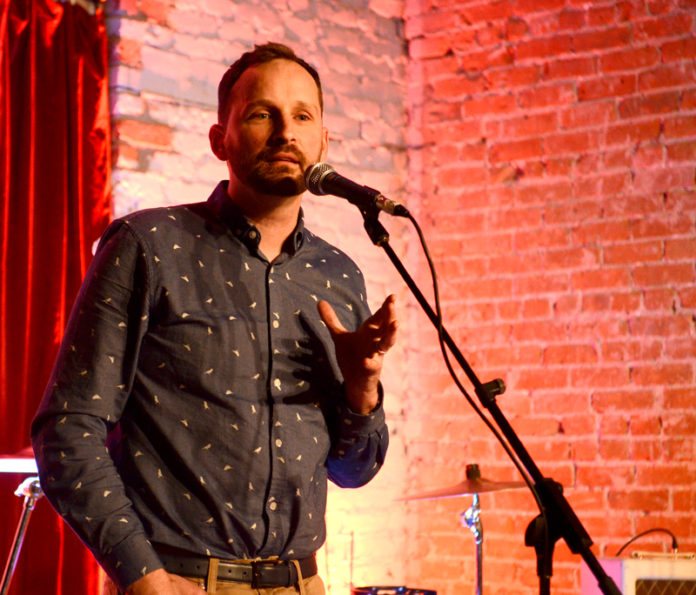
The province must do more to help those living in poverty, NDP leader Ryan Meili says.
Meili spoke about poverty and its connection to crime, addiction and gangs between meetings at the Prince Albert Indian Métis Friendship Centre and with the Métis Nation-Saskatchewan during a visit to the city Monday.
While he was impressed with the work the friendship centres do across Saskatchewan, he said the concerns he heard are not unique.
“It’s not groundbreaking news that we have significant inequalities in our province, and that we have higher rates of poverty,” he said.
He cited the province‘s high rates of poverty among Indigenous people and Indigenous children in Saskatchewan.
Poverty, he said, shows up in health care, social services and justice system.
He said that Saskatchewan is the only province without an anti-poverty strategy. He also noted that it is the only province which does not provide any core funding for friendship centres.
“It’s really impressive work the friendship centred s do in the eleven communities they’re in, serving the needs of Indigenous people,” he said.
“Considering the needs and challenges of this province (not providing funding for friendship centres) seems like a big oversight.”
Meili also connected poverty rates to issues like high crime severity indices (CSI) – Prince Albert is among the communities with the highest Crime Severity Index in Canada, while Saskatoon and Regina are two of the four Census Metropolitan Areas with the highest CSI according to Statistics Canada.
“Crime severity — that is absolutely connected to poverty and the upstream causes of poverty, and poverty as an upstream cause of involvement in crime,” he said.
‘We’ve seen the big spike in Prince Albert and al over the province in meth use and the way that’s influencing types of crime, as well as people winding up in the emergency room, psychosis related to meth use and all kinds of other family troubles within our community. Social troubles that drive addiction are a huge challenge in this province and something that the provincial government has really shown no meaningful interest in trying to address.”
The provincial government has defended its approach towards mental health and addictions. The spring budget featured the largest commitment to mental health in Saskatchewan history. The province is funding 75 new residential support beds for individuals with intensive mental health needs and about 50 new pre- and post- addiction treatment beds for individuals transitioning between detox and inpatient treatment. The province has also added 10 new inpatient addiction beds in Pine Lodge and $1.6 million to support three Rapid Access to Addiction Medicine clinics, one each in Regina, Saskatoon and Prince Albert.
In addition to a poverty reduction strategy, Meili has called for a gang reduction strategy.
“Those things are absolutely intertwined,” he said.
“If we’re concerned about meth, f we’re concerned about gangs, we need to be concerned about poverty and inequality in the province. The failure to act on that is really resulting in a whole lot more trouble.”
The province received $11.9 million from the federal government back in March to help fight gun and gang violence.
In addition to creating a poverty reduction strategy, Meili said there are a few things the government can do to help alleviate poverty.
“A pretty simple thing would be not having the lowest minimum wage in the country anymore. People have a really hard time leaving social assistance and getting to work when wages are so low.”
He also criticized cuts to the rental housing supplement and the special diet provision of social services. He blasted the government’s new income assistance program as not covering utilities and leaving people worse off.
Meili said poverty is costing the provincial economy about $4 billion per year because of lower economic activity and higher health, social services and justice costs.
“It’s important to notice that the new income support program that they have in place is just going to set people up to fall through the cracks,” said social services minister and Prince Albert Northcote MLA Nicole Rancourt.
“It’s unfortunate. They have this opportunity to actually lift people out of poverty. But the program they have in place, even people on the frontlines are saying it is going to make it harder for people to make ends meet.”
The new income support program will begin accepting applications from new clients on July 15. According to the government, it will be “simpler, transparent, client-friendly and have new features that will help transition clients to greater independence and abetter quality of life.”
The program includes monthly earned income exemptions to allow clients to keep more money they make, motivational interviewing, a new online application and a simpler benefit with shelter and basic needs along with a few additional benefits for emergency health and safety needs or job[related expenses. The program “will allow staff to spend more meaningful time with clients, helping them address their challenges instead of filling out paperwork,” the government said.

